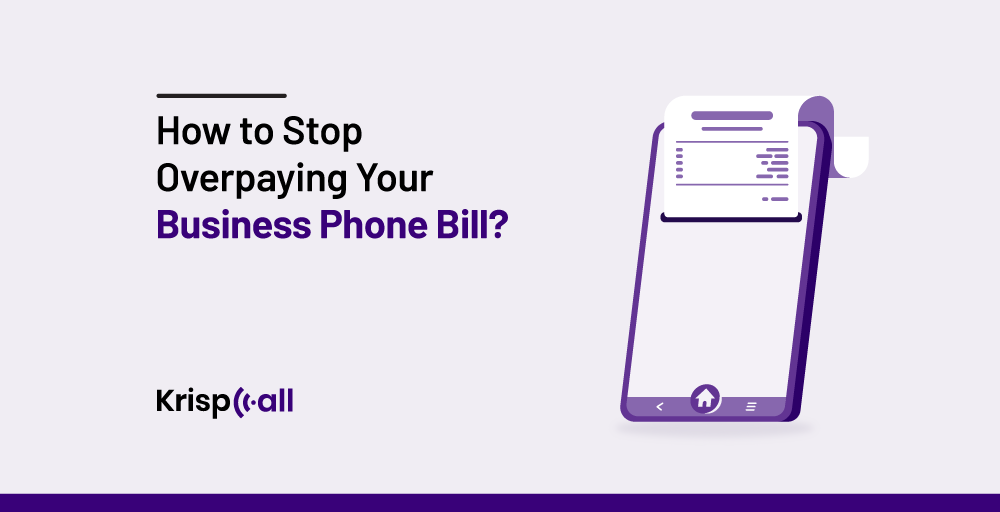Did your telephone bills exceed what you expected or set aside for communication?📞💸 Everyone is overstressed about telecommunication services and their bills. 😥
Therefore, it is time to learn and become wise about choosing the best service provider to save on your phone bills. Your hard-earned money requires better management, and you can learn how to reduce your business’s overall telephone expenses.
According to the Whistle Out survey, companies overpay at least 30% of their phone bills due to extra services and ineffective contract plans. That means many organizations use many resources, especially communication services, with high bills, costly hidden features, strategies, or less efficient plans than these businesses could desire.
In this blog, you will find information on how to cut your business’ phone bill, learn about typical misconceptions businesses make when considering phone contracts, and find cost-efficient alternatives.
📊 KEY HIGHLIGHTS
- High competition and busy day business are why every penny counts. Of all the areas that any business establishment could easily cut down on, phone bills are mostly overlooked.
- Reducing your business phone bill helps save money and is part of better management.
- Negotiating phone bills is one of the most complicated business processes, along with myriad issues that may arise.
- Phone bills should not be negotiated only once but frequently for one reason or another.
- With KrispCall VoIP systems, your business can grow with your needs without having to worry about overpaying for phone bills.
10 Ways to lower your business phone bill
Businesses cannot afford to spend cash unnecessarily. The one cost that companies can often negotiate frequently is the phone expense. As business VoIP services and other new technologies continue to appear, more solutions exist to reduce telephone expenses with your business without significantly losing quality and dependability levels.
As a small business, you need to optimize for efficiency, which begins with slashing your business phone expenses. Here are 10 effective methods for lowering your business phone bill.
1. Conduct an audit of the current plan
The programs proposed to improve your business phone approach should be audited to evaluate their feasibility and practicality. First, look at your current phone plan, lines, allowed minutes, and any other features you may enjoy.
It is wise to analyze usage patterns to see when calls are often made to decide if the current plan is optimal for the business. Identify gaps with unnecessary consumptions or expenditures and find areas you can cut back or eliminate or find areas where resource utilization can be increased to decrease costs.
2. Switch to voip technology

VoIP is an efficient technology that does not transmit voice data over a regular telephone network but over existing Internet networks. It costs considerably less than conventional telecommunication systems.
Discover why people are switching to VoIP from traditional PSTN telephone service with its strengths of being cheaper, easily expandable, flexible, and incorporating options like voicemail to email conversion and virtual number choice.
3. Choose a reliable voip provider
When choosing a VoIP provider, one must ensure that the provider is reliable and offers strong connections, and KrispCall is, therefore, the best choice. By providing software VoIP services for business purposes, KrispCall is one of the most effective services with high credibility, as seen from numerous positive feedbacks and comments.
Krispcall is a voice telephone service provider, also known as VoIP. It is a more improved system of phone services than normal centralized phone services. Krispcall helps you acquire virtual phone numbers from more than one hundred countries and manage your VoIP personal, business, or corporate requirements in a single application.
4. Negotiate with your current provider
In many cases, opting for a new insurance provider is not the best course of action; instead, it is better to sit down with your current provider and negotiate better terms with them.
Do not rule out asking for better terms with the existing phone provider to see if you can get a better rate and more incentives. They observe different conditions, such as loyalty discounts or added promo for a repeated customer.
5. Implement Call Management Strategies
You also need to reduce expenses through call management in a company by avoiding unnecessary toll charges on call forwarding, virtual phone assistant, and calls by time of day or origin. Call management solutions are offered by the top providers.
Additionally, you need to see how certain strategies can be applied in those systems. Also, remember to emphasize how call queuing, call recording, and real-time analytics all benefit call handling and fluency.
6. Embrace remote work solutions

Adopting remote work solutions is an economic measure that organizations can adopt while saving on their phone expenses and, at the same time, enhancing employee connectivity. Here are some ways that remote work solutions can help:
- Reduce Phone Bills: Business phone expenses can be greatly reduced by eliminating conventional work phone lines and using real-time communication solutions such as instant messaging and video calling applications. These tools, which are increasingly relying on internet connections rather than phone lines, can serve as cost-efficient and disposable means.
- Improve Communication: Practical business applications like instant messaging and video conferences, as far as remote work is concerned, enhance the degree of communication interactivity so that employees can call or consult with their peers regardless of the location. By lowering the likelihood of conflicting interpretations, it can also assist in improving cooperation between the parties.
7. Utilize wireless services
A mobile-enabled environment means wireless connections are pivotal to any organization; hence, these services’ reliability is pertinent. Think, for example, about getting a ‘wireless mobile hotspot,’ a smartphone with a calling and data plan, or a VoIP router to suit all your business phone requirements.
All these tools may be useful in ensuring you are in touch with your sales team, customers, or partners during various business meetings. It also offers you the convenience of carrying a hub that allows you to establish your own secure and portable network and access your documents and applications whenever you are on the move.
8. Monitor and adjust your plan regularly

However, once you have discovered which options can be taken naturally to eat into the call costs, make it a practice to check the call costs frequently. Make any changes that appear reasonable for the success of your business to achieve adjustments on your plan for your changing needs or budget.
9. Ask for promotions, discounts, and bundles
Regarding the general concept of smart telecom expense management, you will undoubtedly have to consider what kind of offers your telecom service offers and state current customer bonuses and discounts. There are often promotions, but you might not even know about them unless you are not privy to the finer prints or your current supplier does not know them.
10. Optimizing your business phone system
Using a phone system correctly can improve a business’s efficiency and effectiveness. And while there are many ways that can be used to help that, one way that is the best, is setting up a video tutorial.
Integrating an informative video tutorial that provides information about specific procedures can maximize your business phone system. Another thing that can be done is to provide helpful tips to avoid incidents that lead to inefficiency and high bills are also necessary.
Why is it essential to lower your phone bill?

High competition and busy day business are factors that make every penny count. Of all the areas that any business establishment could easily cut down on, phone bills are mostly overlooked. And guess what? They are the most essential ones.
So, let’s just discuss a few points that explain why lowering your phone bills is important.
1. Financial benefits
There are realistic opportunities to reduce your business’s telephone bills, significantly reducing overhead expenses. You can free up capital for more productive areas like advertising, employee training, and technology upgrades by minimizing and eliminating unnecessary costs.
- Cost Reduction: Cutting the phone bill is an operation-level cost reduction because it brings expenses directly to your pocket. Adopting another phone option and comparing the costs means that you are directed to other areas that can substantially benefit your business, like marketing, the production of new products, or employee incentives.
- Increased Profitability: Extra expenses, such as telephone bills, can be cut to increase operating profits. In its attempt to reap high returns in the shortest time possible, minimizing unnecessary costs is a must for any organization through the long haul.
2. Enhanced budget management
Reducing your business phone bill helps save money and is part of better management. Regarding the former, it is possible to claim that creating effective strategies for managing the working budget residual means saving money, reducing non-essential expenses, and providing the funds needed to obtain more effective results in various departments.
- Budget Allocation: Cutting the phone bill is effective because it helps control the money required to handle various departments and other activities. If you enable simple and efficient communication expenses, you can allocate your funds to projects or initiatives that are the key to business success.
- Predictable Expenses: Managing the phone usage cost leads to definite monthly costs, enabling the person to estimate future costs better and, therefore, have a better plan for cash flow. Expense predictability contributes to stable financial conditions and brings certainty to the business sphere.
3. Competitive advantage
Reducing your business phone bill can give you a significant competitive advantage. Lowering operational costs allows you to offer more competitive pricing to your customers, invest in better technology, and improve your products and services.
- Cost Efficiency: Operating a lean company or organization means running a tight company or organization, which is cost-efficient and sets it up to compete in the market. Reducing phone billing means that the business can set affordable prices for its products and services to consumers while at the same time making good profits, thus creating added value for the industry by strategically positioning the company in the market.
- Resource Allocation: Portioning a portion of the funds saved from infrequent phone use allows shifting the money bound for preservation to other areas that could help you gain a competitive edge: improving innovation, customer service, or product development initiatives. It is advisable to funnel money into areas likely to positively affect the end customers, which helps your business be ahead of competitors vested in similar products.
How often should I check my business phone bill?
It’s wise to review your business phone bill frequently to verify whether it has been reported correctly or if other charges have not been cleared to ensure you are not charged more for business phone calls. Therefore, a monthly check is advisable.
This would enable one to monitor the type of usage, understand the existing plan’s working efficiency, and possibly tweak it to reduce costs while maximizing the benefits gained from its usage. How often does something happen or recur over a period of time, such as monthly, quarterly, or annually?
They will give a complete analysis of the communications that an organization needs, and when it comes to phone services, it will help an organization to make the right decisions and cut down on bills. Therefore, being keen and up to date with your business phone bill will help ensure that you work hard to maintain the phone bills and contribute positively to the business’s financial status.
What mistakes do businesses make when negotiating phone bills?
Along with various issues that may arise, negotiating phone bills is one of the most complicated business processes. If not eliminated, mistakes in this area can lead to massive communication expenses and affect the business development.
Here are some of the most common mistakes:
1. Lack of preparation
Businesses blame a lack of preparation before negotiating with phone service providers. They may fail to negotiate for the pull of the lower effective that best suits their needs because they lack sufficient information on current utilization patterns and other available options.
2. TIP
Taking the ‘First Offer’ tip is not ideal for every occasion as it can lead to sub-optimal solutions. Still, there are cases when taking the first offer is helpful, for instance, in negotiation while job hunting, dealing with employers notorious for low-pay offers, and when time is of the essence.
3. Failure to review contracts
It is always wise not to skim through phone service contracts; this leaves behind essential things that have not been fully understood or hidden unpleasant factors. It can result in businesses entering the contract not knowing they have agreed to terms that are disadvantageous to them or failing to explore and make changes to those terms that are unsuitable to them.
4. Overlooking hidden fees
Some costs are easy to miss because they are printed in small fonts at the bottom of the agreement papers that businesses sign with their phone service providers. Such costs could be progressive and accumulate over time, causing a relatively massive bill if not detected and tackled during the bidding process.
5. Ignoring competitive offers
Not shopping for and/or negotiating the best deals with various phone service providers can constrain businesses regarding the desired contract. This allows advertising businesses to take advantage of price discrepancies by formulating better offers.
6. Not utilizing ‘leverage’
Some organizations do not use their muscle and brains as valuable customer or their willingness to bring their business elsewhere as a threat during the negotiations. This means that in different circuits, there may be lucrative deals other players have negotiated whereby they are offered lower tariffs or other privileges.
7. Neglecting to negotiate regularly
Phone bills should not be negotiated only once but done frequently for one reason or another. Failure to negotiate could also mean that certain companies miss out on opportunities to utilize new promotions, discounts, or even adjustments to their usage.
Conclusion
Lowering your business phone bill is not about saving money. It’s more about returning money to your business’s needs and understanding when a dollar spent on communications is well spent. The strategies described earlier help to minimize the costs and, therefore, facilitate an opportunity to allocate financial resources to other relevant spheres of your business.
First, it is supposed to examine the current bills for telephone services, then search for more favorable tariffs among the service providers, and finally, investigate the opportunities for using relatively new program products such as KrispCall VoIP. All these steps will allow you to save money and make a broader impact by improving your business productivity
.





